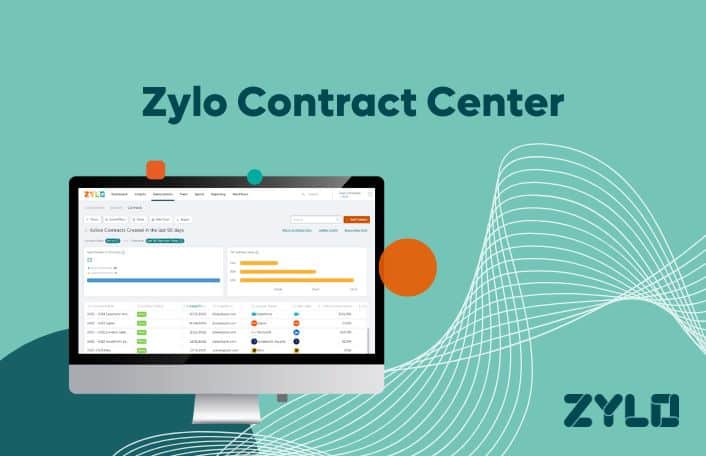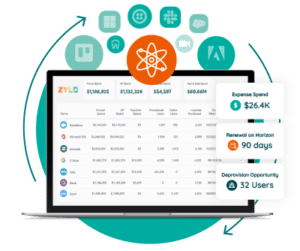
Easier Renewals, More Cost Savings with Zylo Contract Center
Table of Contents ToggleIntroducing Zylo Contract CenterZylo Contract Center BenefitsSave TimeOptimize...
Back
Back
Search for Keywords...
Blog

11/05/2024
Table of Contents
Updated on February 20, 2026 with new data.
Managing SaaS contracts can be an ongoing challenge as businesses scale and new applications proliferate across teams. Without a centralized approach, companies risk overspending, redundant subscriptions, and missed renewals, adding to the complexity of SaaS management. SaaS contract management software provides a streamlined way to handle these contracts, offering visibility, control, and significant savings potential. It creates a unified record for every contract, empowering organizations to optimize their software portfolio efficiently and proactively.
SaaS contract management is the umbrella term for monitoring and negotiating SaaS contracts to trim shadow IT and cut unnecessary costs. It can involve anything from keeping track of all contracts and assigning contract ownership to negotiating with stakeholders for terms and conditions – and anything in between. The unifying element is that they are strategies for SaaS contract management.
Managing software contracts requires constant attention as SaaS applications proliferate across organizations. Common challenges include:
These challenges call for a centralized, organized approach that keeps all contract data accessible and manageable in one system.
According to Zylo’s research, many organizations drastically underestimate the number of SaaS applications within their environment by 107%. They also underestimate their app spend by up to 300%. When you realize that the average large enterprise maintains more than 600 SaaS apps, it’s easy to see how this happens. That means 200 to 300 applications typically remain undiscovered as shadow IT.
Zylo research also shows organizations experience an average of one SaaS application renewal each business day – or two for enterprises. Without a plan in place, contract management quickly becomes unmanageable.
When used in conjunction with a SaaS Management platform that serves as an official system of record—practiced proactively and regularly—SaaS contract management yields several tangible benefits, including:
Challenges come with the territory of SaaS. Between endless entry points and the unfettered growth of SaaS expenses—and how often those expenses are miscategorized—SaaS has many difficulties. However, the benefits above aren’t intangible; you can achieve them with SaaS contract management.
With effective SaaS contract management, you will:
The SaaS contract management lifecycle covers each phase from contract creation to renewal or termination. In short, it helps organizations maintain control over their software investments. Key stages include:
Following this lifecycle helps organizations reduce costs, maximize software value, and maintain compliance.
SaaS contract management is a component of SaaS spend management but with a more granular focus on the specific contractual details and terms. Storing these details in a SaaS Management Platform or other record-keeping system provides an easy-to-follow, holistic snapshot of cloud-based software. In turn, it enables new software management capabilities, avenues for cost containment, and leverage for improved return on investment for SaaS.
Follow these steps to jump-start the SaaS contract management process for your organization:

Every SaaS application includes a contract or user agreement to establish terms of use, start and end dates, license quantity, data handling conditions, and renewal information. As you identify all of your existing SaaS contracts, note each tool’s key contractual terms.
Storing contact details in a centralized SaaS Management system of record, such as Zylo, allows you to effortlessly search by vendor name or application type, quickly locate important information without reading lengthy contracts, and simultaneously compare details from multiple contracts.
With a comprehensive understanding of your full SaaS inventory and contractual terms in place, look for optimization opportunities to consolidate duplicate applications, eliminate redundant or underutilized applications, and leverage better financial and security terms upon renewal.
SaaS contract management software is a specialized tool designed to simplify and centralize the administration of all SaaS contracts. It enables organizations to track every SaaS agreement, monitor key terms like renewal dates and licensing details, and maintain compliance with security and data-handling requirements. By consolidating these details into a single platform, companies can reduce waste, eliminate redundant applications, and manage renewal processes seamlessly, ensuring they gain maximum value from their SaaS investments.
Implementing SaaS contract management software simplifies how organizations handle software agreements, from centralizing contract details to reducing security risks. Below are the key features and advantages:
Maintaining a centralized repository for all SaaS contracts is essential to efficient management. This approach saves time, offering an easily accessible, unified view of contracts with critical data, including terms, renewal dates, and license details. Zylo’s Contract Center is a prime example, acting as a single source of truth that helps teams stay informed and aligned on all contract specifics without sifting through scattered documents.
Effective SaaS contract management software ensures organizations stay compliant with contractual terms and track associated security and financial risks. For instance, Zylo’s Security Detail provides visibility into each application’s security status, while App Budgets reveal potential overages, allowing for proactive adjustments. These tools are invaluable for mitigating both security and financial risks, especially as shadow IT grows.
Automated alerts are vital in staying on top of SaaS renewals and avoiding unexpected costs. Alerts notify stakeholders of upcoming renewals, contracts lacking ownership, or even missing documentation, making it easier to assess usage and needs before committing to another cycle. With Zylo’s Automated Alerts, you can set reminders for essential dates, prevent auto-renewals that might otherwise go unnoticed, and ensure all necessary preparations are complete in advance.
Better analytics and reporting capabilities provide powerful insights into your SaaS portfolio. Dashboards, like those available in Zylo, allow users to visualize metrics such as spending trends, renewals, and application ownership status at a glance. Customizable widgets and automated reporting further enhance visibility by sending scheduled reports to key stakeholders, allowing for data-driven decisions around contract renewals and usage optimization.

Selecting contract management software tailored to your organization’s needs requires focusing on key capabilities and features that will ensure a seamless and effective management process. Below are the factors to consider when evaluating different options:
Begin by outlining your organization’s specific requirements. Consider the volume of contracts you manage, the complexity of contract terms, and the current pain points in your SaaS contract management process. Understanding these factors will clarify which features are essential and help filter options that best match your goals.
Ensure the software can scale with your organization’s growth. A solution that handles an expanding volume of contracts, users, and workflows will prevent the need for frequent upgrades or replacements. Scalability also allows the software to adapt to future expansions in your SaaS stack, providing a long-term solution.
Adoption is critical, so look for a platform with an intuitive interface that simplifies tasks like tracking renewals, accessing contract details, and collaborating with stakeholders. A user-friendly design minimizes the learning curve, increases efficiency, and promotes regular use across teams.
Effective contract management software should integrate seamlessly with your existing tech stack. Check for compatibility with expense management systems, ERP, or CRM software, allowing for smoother data transfer and consolidated insights. For instance, Zylo integrates with various platforms, enabling cohesive software and contract management.
Security is paramount, as contract data often includes sensitive information. Look for management software that enforces robust security protocols, such as encryption, access controls, and compliance with GDPR or SOC 2 standards. Zylo’s Security Detail, for instance, includes features that identify and assess security risks within your SaaS portfolio, helping to maintain compliance across applications.
Automation reduces your manual workload, allowing your team to focus on higher-value activities. Seek out software with AI capabilities for intelligent insights, such as usage analysis and predictive spend forecasting. While not directly tied to contract management, don’t discount features like automated workflows, which streamline related processes like license reclamation and renewals.
Robust customer support can significantly ease the transition and ongoing use of new software. Evaluate the available support options and read reviews to understand how the software performs in real-world scenarios. Responsive support teams and positive customer feedback indicate a reliable, user-centric platform.
SaaS will continue to grow in the coming years, with end-user spending predicted to surpass $138 billion by 2024.
With a robust SaaS contract management process, your organization can reap considerable financial and time savings, reduce duplicative spending and redundant software, leverage better contractual terms, and, most importantly—avoid the dreaded automatic renewal. Zylo’s Contract Center allows you to revolutionize your SaaS contract management and get your SaaS and renewal sprawl under control. It drives savings and unifies your management strategies.
Learn more about Zylo Contract Center here. Check out a demo to see it in action.
SaaS contracts generally include terms for subscription duration, pricing, user access, security requirements, and renewal conditions. Comprehensive terms help set clear expectations and minimize compliance risks.
Auto-renewal clauses, pricing adjustments, and licensing terms deserve close attention. Auto-renewals, in particular, can lead to unplanned expenses, so note any cancellation deadlines and set reminders well in advance.
Proactive vendor management involves routine evaluations of vendor performance, cost-effectiveness, and alignment with your needs. Reviewing usage metrics and industry standards ensures your vendor relationships remain beneficial.
Centralized records simplify contract tracking, license management, and renewal processes. This detailed data supports more informed decisions and quick access to accurate details during negotiations or audits.
User-based pricing models benefit from regular license audits to prevent overspending. Track active users and adjust licenses as needed, particularly before renewals, to ensure alignment with actual usage.
CRM systems focus on customer relationships and sales, while contract management software is tailored to handle contract creation, storage, and compliance tracking.
The primary purpose is to simplify and organize contract handling, ensure compliance, manage renewals effectively, and control costs.
Key features include a centralized contract repository, automated alerts, analytics, compliance tracking, and integration options. Together, these tools streamline SaaS Management across the organization.
These systems generally implement encryption and access controls while complying with standards like SOC 2 or GDPR, keeping contract data secure.
Yes, most platforms integrate with ERP, CRM, and expense management systems, allowing data sharing and reducing manual data entry.
Most providers offer onboarding and user training, with ongoing support options such as tutorials, documentation, and custom support programs.
Pricing often varies based on user count, features, and integrations, with many platforms offering tiered models or custom quotes based on organizational needs.

Table of Contents ToggleIntroducing Zylo Contract CenterZylo Contract Center BenefitsSave TimeOptimize...

Table of Contents ToggleWhat Is SaaS Contract Management?The Challenges of Managing...

Table of Contents ToggleWhat Is SaaS Contract Management?The Challenges of Managing...

Table of Contents ToggleWhat Is SaaS Contract Management?The Challenges of Managing...
| Cookie | Duration | Description |
|---|---|---|
| cookielawinfo-checkbox-analytics | 11 months | This cookie is set by GDPR Cookie Consent plugin. The cookie is used to store the user consent for the cookies in the category "Analytics". |
| cookielawinfo-checkbox-functional | 11 months | The cookie is set by GDPR cookie consent to record the user consent for the cookies in the category "Functional". |
| cookielawinfo-checkbox-necessary | 11 months | This cookie is set by GDPR Cookie Consent plugin. The cookies is used to store the user consent for the cookies in the category "Necessary". |
| cookielawinfo-checkbox-others | 11 months | This cookie is set by GDPR Cookie Consent plugin. The cookie is used to store the user consent for the cookies in the category "Other. |
| cookielawinfo-checkbox-performance | 11 months | This cookie is set by GDPR Cookie Consent plugin. The cookie is used to store the user consent for the cookies in the category "Performance". |
| viewed_cookie_policy | 11 months | The cookie is set by the GDPR Cookie Consent plugin and is used to store whether or not user has consented to the use of cookies. It does not store any personal data. |